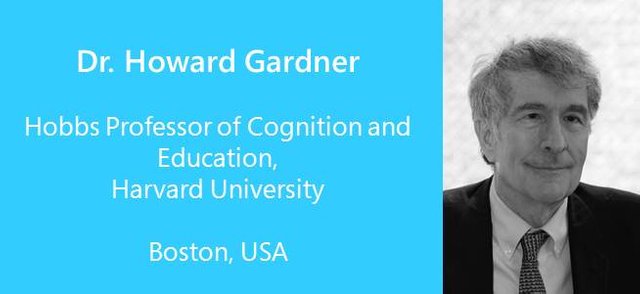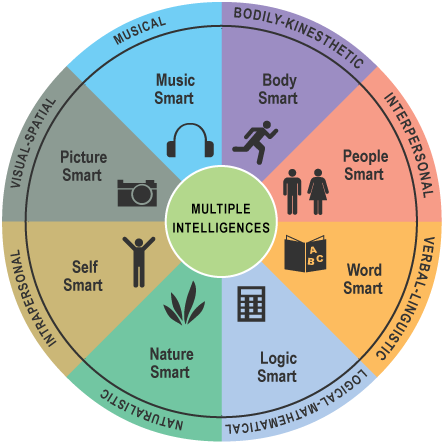What Teachers Should Know about Howard Gardner : Multiple Intelligences Theory
He was born in Scranton, Pennsylvania on July 11, 1943. His full name is Howard Earld Gardner. He is an expert in the field of education as well as a psychologist who introduced the theory of Multiple Intelligences that well known in the world of education today (source).
Throughout his life, Gardner has learned from various psychologists such as J. Piaget, R. Brown and N. Geschwind. During that time Gardner reached various degrees from various universities such as Professor of Education from Harvard Graduate School of Education, Adjunct Professor of Psychology from Harvard University, Adjunct Professor Neurology from Boston University of Medicine. In addition, he also heads up a project called Project Zero at Harvard University. (Source)
For his contributions in education and psychology, Gardner was awarded twenty honorary degrees from various educational institutions such as from McGill University and Princeton University. Through his famous book "Frame of Mind" Gardner proposed the theory of Multiple Intelligences in 1983. The book is his thought after a long research on humans, and the book is a criticism of people's perceptions that assume a child's intelligence is seen from only one aspect, only seen from the intellect in the field of mathematics.
Garnerd's Multiple Intelligences
The background of the emergence of the concept of multiple intelligences revealed by Gardner is due to wrong public perception of a child's intelligence. In this case, the school and the culture of the society at that time were too justified that an intelligent child was only seen from the aspect of linguistic intelligence and numerical intelligence. Therefore, Gardner tries to criticize these perceptions and societies by expressing a theory called Multiple Intelligences.
According to Gardner Human intelligence is divided into eight intelligences (Source):
Linguistics Intelligence: This intelligence deals with one's ability in using language properly, both in speaking and in writing. A person with this ability tends to be poetical and rhetorical in expressing their ideas through a language used. For a child with this intelligence it is possible to learn to become a lawyer, author, orator, and poet.
Logical Intelligence:
This intelligence deals with one's ability to analyze things through mathematical and scientific approach logically. This intelligence will involve someone to elaborate on a matter of exploring certain patterns based on deductive and logical reasons.Musical Intelligence: This intelligence deals with one's ability to play music. Someone who has this intelligence is very sensitive with his ears to listen the musical instrument and is able to recognize the patterns of instruments, tone and rhythm of the music. It would be better if this intelligence was developed with linguistic intelligence.
Kinesthetic Intelligence: This intelligence involves the whole body or part of a person's body in doing the attraction. This intelligence involves a person's body and metal. athletes are person who have kinesthetic intelligence.
Spatial-Visual Intelligence: This intelligence involves the visual ability of a person through images and imagination. People with this intelligence are usually painters and architects because they has a strong imagination of the picture of a thing, and can be channeled the imagination into the form of pictures and paintings.
Interpersonal Intelligence: This intelligence deals with one's intelligence to understand the motivations, intentions and desires of others. People who have this intelligence will be very easy to make friends and communicate with others. People who have this intelligence is very suitable to be a counselor, teacher, and leader.
Existence Intelligence: This intelligence deals with one's ability to express what is in him through various spiritual processes. Theologians, religious leaders, philosophers are human beings who possess this ability.
Nature Intelligence: Intelligence related to one's ability to recognize nature including species of plants, animals and the environment. By having this ability one will easily group the species that exist in this nature, and they will tend to be sensitive to changes and natural conditions.
Conclusion
For teachers, understanding the concept of Multiple Intelligence is very important in the effort to educate and teach students in schools. By understanding the various intelligences of the children, it will be easy for the teacher to develop every potential skill of students in the right way. Thus, students can develop according to the potential of their intelligence.
References
Wiki2.org.
Biografi Singkat Howard Gardner
Multiple Inteligences: Gardner's Theory
@affiedalfayed
(a teacher and writer)

USE #steemiteducation TAG
TO SUPPORT EDUCATIONAL CONTENTS AND RESOURCES


This is incredible information. I didn't realize that our intelligence has been split up in such a way by Howard.
It makes a great deal of sense and you can see straight away how it would benefit teachers in schools. For so long I have just assumed we develop skills based around our interests and then we are either, brilliant at music or great at maintaining relationships etc. But this creates a different understanding based around intelligence and gives a great starting point and understanding for growth.
Thank you for the knowledge.
Of course, this idea from Gardner is very popular today in the field of education an psychology @calumam
Good article brother
Great
nice sharing..
good post, I like your post ..
I need your support please visit my blog https://steemit.com/@muliadi
if you like my post please give upvote, resteem &follow me.
thank you, keep on steemit